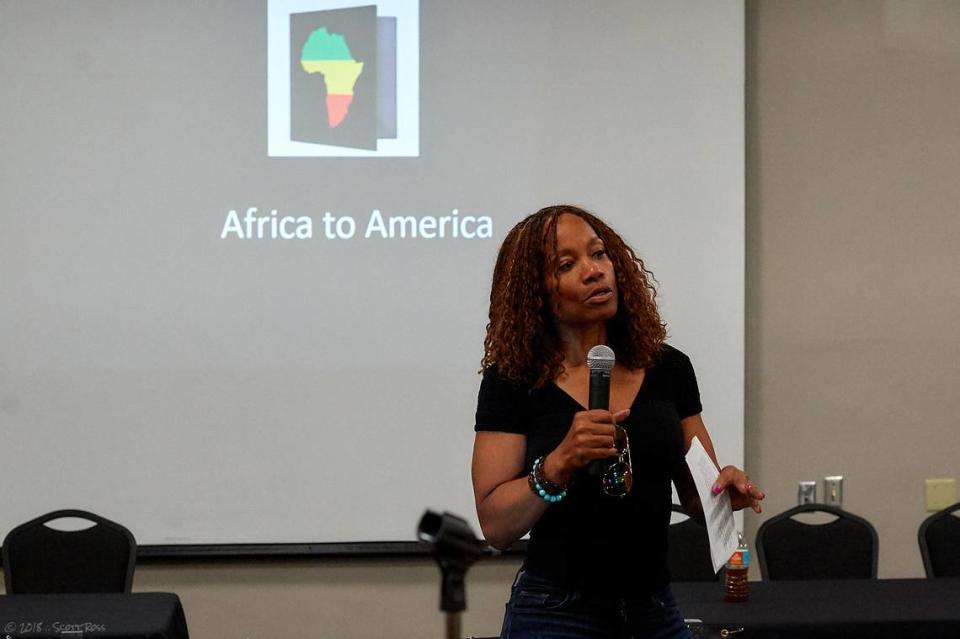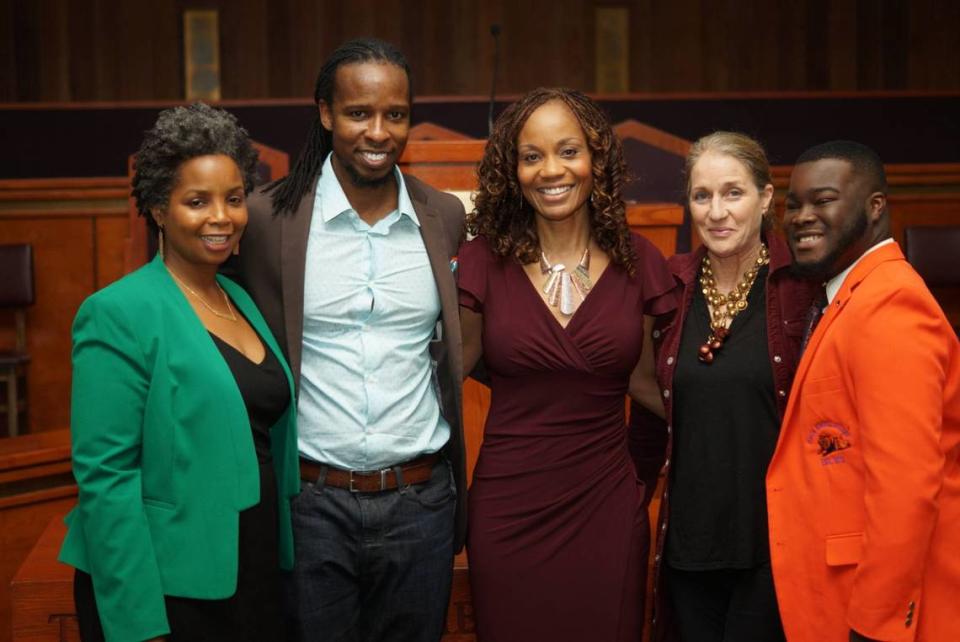How a Miami group is trying to dismantle racism by leading difficult, honest conversations
The virtual discussion on the Black Cuban experience had just gotten underway but Roni Bennett wanted to establish a few ground rules.
“We also acknowledge that this land was founded upon exclusions and erasures of many Indigenous peoples,” Bennett told the audience. “Racism is real. White privilege is real. Everyone can work to end racism. Everyone has a role.”
These sorts of affirmations could make many uncomfortable. Race is something that permeates American society yet conversations on the topic can be clunky or condescending.
That, however, is exactly why Bennett started South Florida People of Color: to provide a platform for racial dialogue with the end goal of eventually eradicating prejudice. And after 2020 shined a spotlight on racial justice, SFPoC is poised to be a vehicle for change in Florida through programming and Diversity, Equity and Inclusion training.
Black Americans are “systemically excluded based on things like money and connections,” said Bennett, SFPoC’s executive director. “We’re trying to just educate people to be able to dismantle racism by at least understanding what those issues are.”
Discussion of Ta-Nehisi Coates’ book
Originally known as the Miami Shores People of Color, the nonprofit started in 2015 with the initial goal of encouraging more civic participation among the village’s Black residents. It took just one event during Black History Month — a discussion of Ta-Nehisi Coates’ “Between the World and Me” hosted by Florida Memorial University associate provost Tameka Bradley Hobbs, who now serves as SFPoC’s board chair — for Bennett to realize she needed to do more.
“This was Black History Month and there was almost a majority of white people,” Bennett said of the event. To her surprise, the forum was a hit. “They loved it and wanted to have more. What we realized was that people need to come together and talk.”
That event spawned the Unity 360 Community Race Dialogues. The program gathers between 30 and 70 individuals of all colors to chat about a book or film that “helps to expand people’s space of knowledge around the way systemic racism has worked both historically and in the contemporary sense,” says Hobbs.
“Our hope is that once they have the understanding they will be motivated to be a part of the change,” added Hobbs, who teaches African American studies at FMU and is the founding director of FMU’s Social Justice Institute.

The creation of Awkward Dinners soon followed. Unlike Unity 360, the dinners, which Bennett simply describes as bringing “people together over dinner and drinks to talk about white supremacy,” are held with smaller, more intimate groups. The exclusivity has turned it into arguably their most popular program, Bennett says, with a wait list of roughly 700 people.
Both programs highlight what ultimately differentiates SFPoC from other organizations in the racial equality space: the promotion of authentic, honest conversation to establish empathy.
It’s a characteristic that has earned SFPoC high honors — the Greater Miami Chapter of the American Civil Liberties Union presented it with the Rodney Thaxton Racial Justice Award in 2017, while Awkward Dinners finished first in the 2018 Philanthropy Miami’s Shark Tank contest. SFPoC also has partnerships with FMU and HistoryMiami.
Bennett’s interactive style has also served her well as she dives further into Diversity, Equity and Inclusion training, a form of programming that SFPoC began offering in 2018 and which took off in 2020 following the police killings of George Floyd and Breonna Taylor.
“What we try to get people to do [is share] when a situation happened to you,” Bennett said. Questions like, “When was the first time that you even realized your race” are “much more impactful” than simply explaining microaggressions and unconscious bias. “We look at it from a restorative practice perspective. It’s not people just listening; it’s very experiential. When you’re doing, you’re seeing, you’re hearing, you’re talking, that transforms you.”
Broadening discussions to include Miami business leaders
With Florida home to one of the largest Hispanic populations in the country, diversity looks a lot different here. That is especially true in South Florida where Hispanics in 2019 accounted for 69 percent of the population in Miami-Dade, 31 percent of the population in Broward and 23 percent in Palm Beach County, according to U.S. Census estimates.
Rather than just checking the diversity box, local companies have to make a concerted effort to hire Black people, Hobbs explained.
“We can’t use these kind of same, blanket national measures to really measure equity and inclusion in South Florida,” said Hobbs. “It’s not the same.”
Added Bennett: “It’s not just about bringing people in — it’s what do you do with them when they come and how do you become more equitable.”
Kieran Bowers, the vice chairman at Swire Properties, the developer of Brickell City Centre, was one of the executives across the country who saw 2020 as an opportunity to rid his workplace of bias. Bowers had learned of Bennett after she hosted an Awkward Dinner with Friends of the Underline, where he serves on the board. While he did not attend the dinner, the rave reviews convinced Bowers that Bennett needed to lead a similar effort with his fellow Swire executives.
“The tragic murder of George Floyd was a good catalyst for us” to further engage in the work of DEI “given the groundswell of sentiment that was amongst the younger population, particularly here in Miami,” Bowers said.
In Bennett’s training, Bowers recalled learning “the history and challenges of the Black community” through a host of workshops and Awkward Dinners over the span of roughly a year. Of the many discoveries that Bowers and others made, one in particular — the disparate treatment of Pride Parade and Black Lives Matter marchers in Brickell City Centre — stood out.

“The more we put up a defensive mechanism, the more it sends a signal that we’re treating the community differently,” Bowers said of how the property handled BLM protests in the past. This realization led them to try “a more engagement approach like handing out bottles of water, for example, and just trying to present a more friendly, corporate face.”
These types of epiphanies aren’t happenstance; they are the result of SFPoC’s effort to educate and empower individuals to better discuss racism. Bowers himself even noticed how he and his fellow executives became more open to admitting their own biases, something that was virtually non-existent at the top of 2020.
Admitting blind spots
“That’s really the penny-dropping moment: when everyone is actually proactively admitting their own blind spots and being that vulnerable,” Bowers said, noting his staff will undergo a similar training that he expects will make recruiting diverse candidates easier.
With a track record of helping individuals become more racially conscious, Bennett intends to find even more arenas to educate. She cites the philanthropy and nonprofit fields as two spaces that could benefit from her teachings — just one uncomfortable conversation at a time.
“It’s not just about communities but also transforming the cultures in these organizations,” said Bennett, recognizing the need for allies in the battle for equality. “Racism is all over. It’s not just in the criminal justice system, it’s in the air we breath. It’s not like we can do everything but we can uplift a lot of other organizations as we work together to dismantle racism.”
How to help
▪ South Florida People of Color: https://southfloridapoc.org/
▪ 305-814-4063
▪ @sfpoc on Instagram, @MiamiShoresPoC on Twitter, Miami Shores PoC on Facebook

